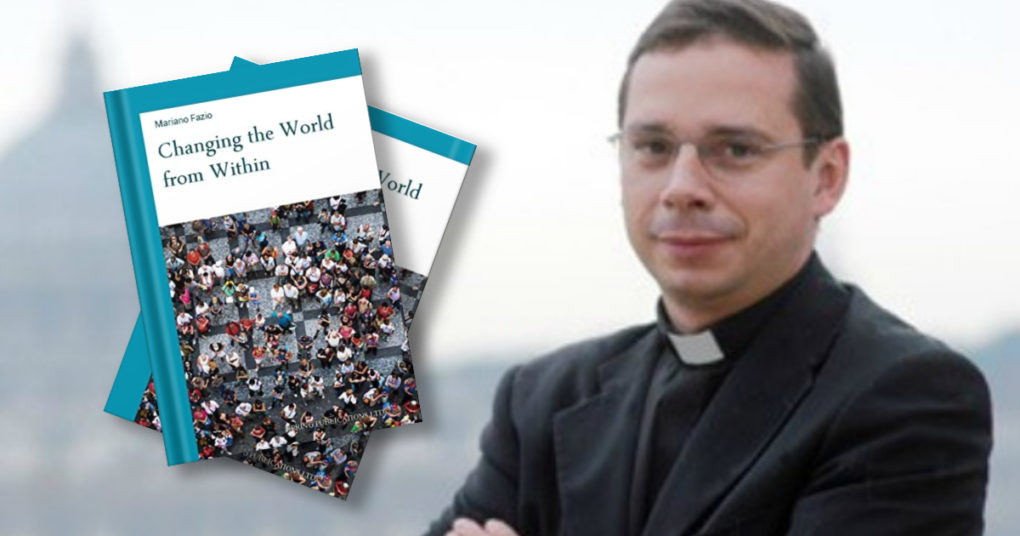Changing the World from Within
Msgr Mariano Fazio
Spring Publications
2021
101 pages
“We all want to change the world!” so goes the line in Revolution, that classic song on the Beatles’ White Album of 1968, that year of so called revolutions. But how do we really change the world? Msgr Fazio has suggestions, and not surprisingly, they start with oneself, hence the title of this excellent short book. He unashamedly wants the world to be changed to one which is influenced by Christian values, so for today’s Ireland he might seem to be running counter to the prevailing tide of public opinion, yet these values are more necessary than ever as we see the disintegration of our society through drug abuse, organised crime and the breakdown of marriage.
The book has eight chapters, the first of which is “Called to be a Christian Today”. In this one he sets the tone by reminding us of the universal call to holiness, something central to the teaching of the Second Vatican Council which of course took place in the mid 1960s in the very years that the Beatles shot to worldwide fame. This teaching was a hundred times more radical that anything the Beatles or any 1960s philosophers were preaching – it was new and yet rooted in Scripture, where Jesus said “Be ye perfect as your heavenly Father is perfect.” Somehow for 1900 years of the Church’s history, the idea that that call actually applied to the laity was all but forgotten.
Using that call as a springboard, in the second chapter, Msgr Fazio launches into the centrality of love – love changes everything (also the title of a song, this time from the late 1980s). He spells out one very important condition – in order to improve anything, we must look at it with the eyes of love. When one truly loves another person that love covers their defects and limitations – we see this in the love of a parent for a child, of a citizen for his country or even a sports’ fan for his team. With quotes from Chesterton on the one hand and the founder of Opus Dei on the other, he develops this idea but emphasises that while we must love the world, this does not mean we love worldliness.
In his third chapter entitled “First to Know in Order to Love and to Heal” he is beginning to get to the core of the book’s thesis – we must know something or someone before loving, but not in the cold and callous way of the protagonists of Dickens’ Hard Times. He goes on to quote at length both Pope Francis and Pope Emeritus Benedict in their spelling out the dangers of consumerism, individualism, hedonism and relativism. He emphasises that the Christian’s outlook has to be optimistic and lists the following as the essentials if we want to give a Christian orientation to the world: a spiritual life, to be well versed in Christian doctrine, unity of life, social prestige and the style of the early Christians, who of course did radically change the individualistic and hedonistic Roman Empire
The fourth chapter is entitled: “A True Christian: No One Gives what He Doesn’t Have.” In it he lays it clearly on the line saying that “The driving force for someone wishing to improve the world is his love for Christ, the source of love for neighbour” and proceeds to quote the present Prelate of Opus Dei, Fernando Ocáriz: “If we want to learn to love, we have to contemplate Jesus Christ because his love for all mankind is the measure and paradigm of Christian charity.” The chapter goes on to talk about presence of God and prayer – essentials for changing oneself firstly and then helping influence others for good. Near the end of the chapter, comes the statement: “The Christian revolution is being prepared in the convents of cloistered life where contemplative souls pray and offer sacrifices for all mankind. It is also being prepared in the interior life of Christians living in the middle of the world who are immersed in God, those who with the Lord’s grace try to be contemplatives in the world.”
The book has four more chapters: “A Child’s Piety and a Theologian’s Knowledge”, “A Model Christian: Unity of Life”, “You Can Influence Others”, and “In Line with The Gospel” which pose the challenge of getting to know our faith and putting it into practice, thereby influencing others and making society better. He finishes with a quote from Pope Francis: “Sincere gift of self, joy, spirit of service, sober lifestyle, purity, dialogue, knowing how to listen, courage, mercy, compassion, thirst for justice. Aren’t these the elements of a Gospel style that reflect the life of Our Lord? We might add others but I think these are enough for us to examine our consciences if we want to be involved in changing this world of ours which we love passionately and want to bring back to God.”
About the Author: Pat Hanratty
Pat Hanratty taught Science/Chemistry in Tallaght Community School from its inception in 1972 until he retired in 2010. He was the school’s first Transition Year Co-ordinator and for four years he had the role of home School Community Liaison Officer.

